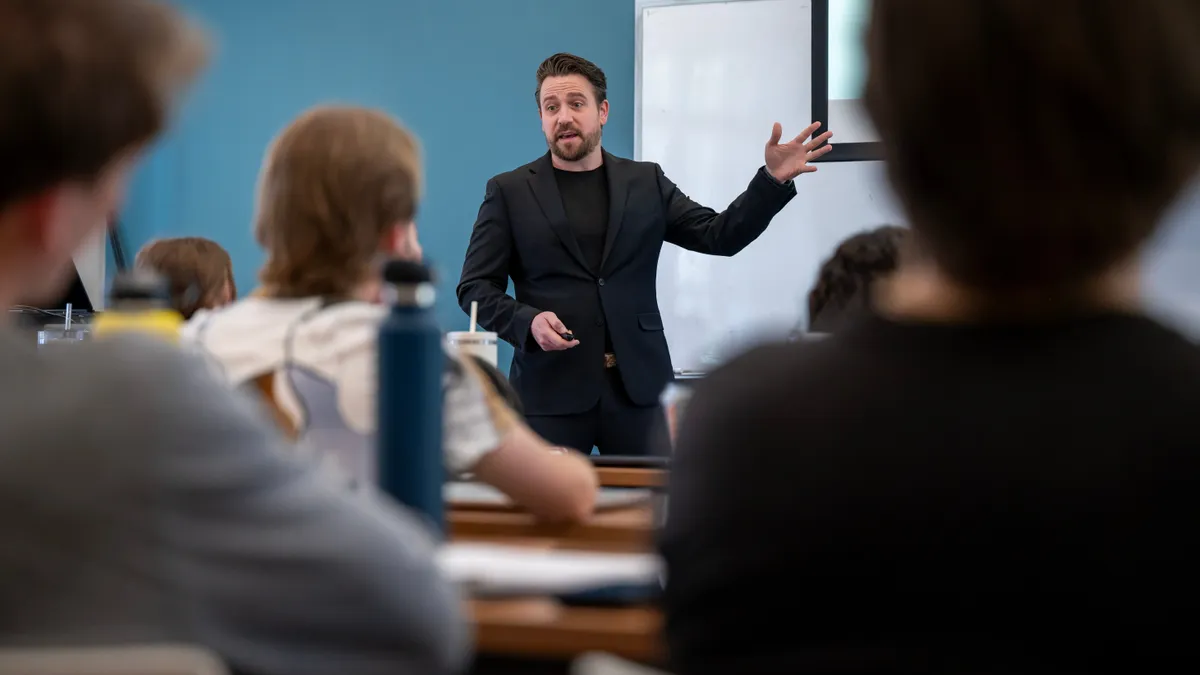As generative artificial intelligence (AI) continues its rapid ascent, higher education institutions are pondering strategies for adapting and equipping their students with the skills necessary to thrive in an AI-oriented workforce.
Despite the pressing need for AI literacy, a recent BestColleges survey found that just 53% of students say they have been assigned coursework that requires them to use AI. This may be in part because faculty and staff are often unsure about how to integrate AI into the student experience. A report from Ellucian, a campus technology solutions provider, notes that fewer than one-third of higher education professionals have experience using AI as a part of their job.
Mustafa Akben, Ph.D., an assistant professor of management at Elon University's Love School of Business, is an applied generative AI researcher and AI enthusiast. His passion for AI literacy has driven him to become an early adopter of AI tools and a strong advocate for their integration into undergraduate education. His innovative methods and creative generative AI applications have garnered recognition, including a winning machine learning model in last year's Society for Industrial and Organizational Psychology AI competition.
Akben's dedication to leveraging AI as part of his curriculum stems from a belief in its capacity to revolutionize learning and better equip students for the demands of the modern workforce. He uses several different approaches aimed at addressing the gap in readiness for AI integration that can help faculty better evaluate the challenges and opportunities AI presents in student work.
In the classroom, Akben encourages students to consider three possible impacts of AI on the future of work: replacement, augmentation and transformation. Akben encourages students to assess situations where AI can replace human work, such as by automating repetitive tasks that fall short of delivering significant worth; where it can augment human work, such as by using generative tools to assist with writing and improve accessibility; and where it can transform work by inspiring greater creativity. He stresses that AI won't eclipse human intelligence in the workplace in the foreseeable future, but will likely supplement – and ultimately improve – the work produced.
Akben urges his students to develop skill sets that protect them from a potential future where certain jobs may be automated. By focusing on uniquely human abilities such as critical thinking, creativity, emotional intelligence and ethical judgment, he believes students can future-proof their careers. Additionally, he emphasizes the importance of understanding how to work alongside AI tools to augment their own abilities and transform the way they approach problems. Through this balanced perspective, Akben aims to empower his students to navigate the rapidly evolving landscape of AI and secure their place in the workforce of tomorrow.
Furthermore, in his research, Akben explores the impact of generative AI on human cognition, specifically focusing on creativity. In a recent research study, he tasked students with generating ideas under three conditions: working independently, using Google for inspiration or using AI for inspiration. The results were striking – the students in the AI group generated the most interesting ideas. Even more impressive, when these students returned to generating ideas without AI assistance, their creativity outshone that of the other groups. This suggests that interaction with AI had a lasting impact on their creative processes. Dr. Akben's study highlights the potential of AI as a powerful tool for enhancing creativity when guided by human expertise and intention, a finding he plans to publish this year.
Simply by its nature, generative AI draws on insights from multiple disciplines, including mathematics, philosophy, linguistics, neuroscience and more. To unlock the full potential of AI on campus, Akben notes, all academic disciplines should have a seat at the table. Collaborative efforts among experts from diverse fields – and from university leadership – are essential for tackling the complex challenges AI presents. With this in mind, Akben recommends universities form an AI task force composed of a diverse group of faculty and student voices from many disciplines, departments and majors to foster a culture of collaboration and integrate interdisciplinary approaches into AI adoption. At Elon University, he sits on such a task force.
Finally, Akben recommends a proactive approach that avoids campus bans on student use of AI technology. Rather than restricting these tools – especially as students become more eager to learn how to utilize them effectively – Akben recommends educators embrace a proactive approach and investigate how to integrate these technologies into coursework. For instance, educators can design assignments that require students to use AI tools and then critically evaluate the output. They can also focus on developing skills that AI currently lacks, such as complex analysis, social cognitive skills and nuanced ethical judgment. By fostering AI literacy in conjunction with these uniquely human abilities, educators prepare students for a future where collaboration with AI is most likely to become the norm.
As university educators explore the ways generative AI impacts their fields and consider how to better equip students to be leaders in the utilization of AI in their careers, it's clear that collaboration, creativity and proactive engagement will be the key to unlocking AI's full potential. To learn more, visit “AI and Your Teaching,” a resource produced by Elon University's Center for the Advancement of Teaching and Learning.










